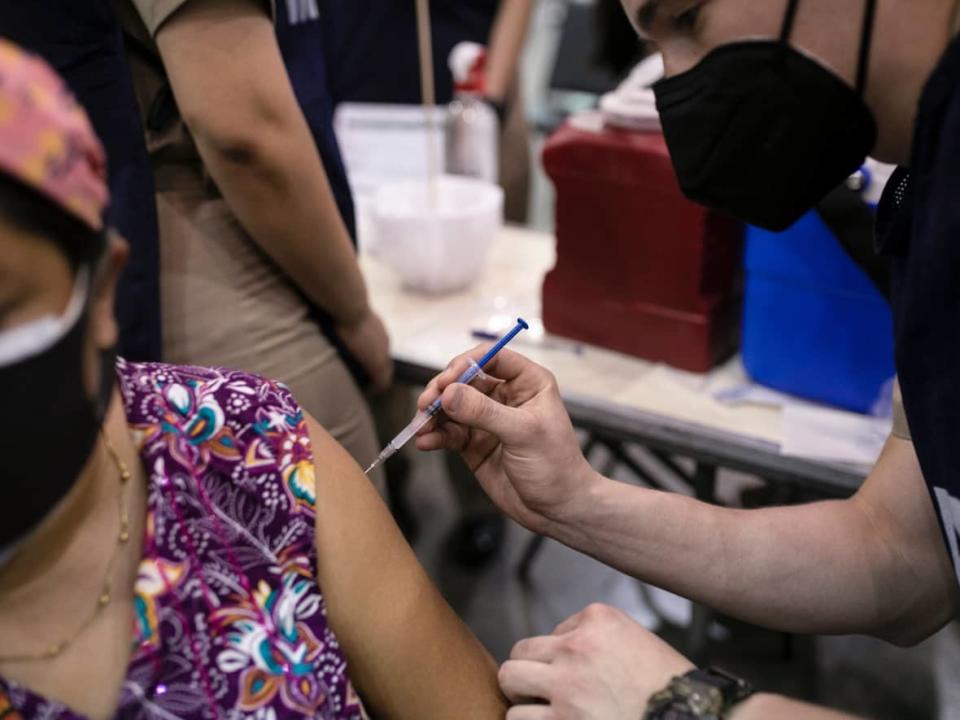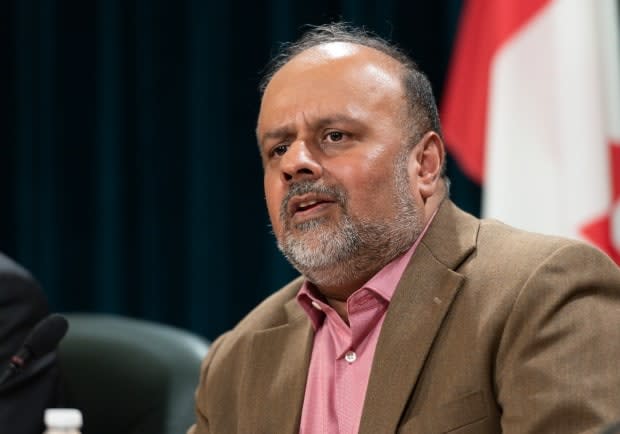Antibody treatment now available in Sask. not a replacement for COVID-19 vaccination, experts say

Saskatchewan health workers now have another tool available to treat some COVID-19 patients, but health experts and officials are reminding the public that the therapy is not a substitute for vaccination.
Monoclonal antibody treatment is supposed to help keep COVID-19 patients who are unvaccinated or severely immunosuppressed out of Saskatchewan's hospitals, according to a Monday news release from the province.
The Saskatchewan Health Authority is already rolling out the monoclonal antibody injections in Saskatoon and Regina this week at provincial testing sites.
As of late Tuesday afternoon, two patients had already received the treatment, the province's Ministry of Health said in an email.
However, this treatment for COVID-19 patients deemed at-risk for becoming severely ill has limitations.
Monoclonal antibody treatments only work on patients who have no or very low levels of anti-bodies — meaning most vaccinated people wouldn't qualify.

Comparing high COVID-19 transmissions with an icy road, Saskatchewan Chief Medical Health Officer Dr. Saqib Shahab said monoclonal antibodies are like an ambulance that may or may not arrive in time after an accident.
"Vaccines are like the seatbelt, so that if you do get in a crash, they reduce your risk of serious illness or death," he said on Monday.
"Just because you may have an ambulance that could arrive in time doesn't mean you shouldn't put your seatbelt on."
The province also says the treatment should only be used in the early stages of a mild to moderate COVID-19 infection, and within five days of people becoming symptomatic.
The province has been providing information about the newly available treatment through social media and other channels.
But one health policy advisor thinks that might send the wrong message.
"I'm surprised at … our government getting into the business of recommending a particular line of treatment," said Dennis Kendel, a retired doctor and health policy advisor from Saskatoon.
The treatment "is a very limited option in medically indicated circumstances.... It isn't something that, you know, everybody's going to be able to get."
There is a risk that promoting the treatment might give some people the idea that they don't need to get vaccinated, said Kendel.
"It doesn't help the vaccination effort. If anything, it probably … makes people more complacent about vaccinations."
When asked why the government was publicly promoting this particular treatment, the Ministry of Health said in an email that residents who may be eligible need to know about the availability of the monoclonal antibodies, as one of the criteria for the therapy is that it must begin within five days of people showing symptoms.
"Disease prevention is the priority for our health system and we strongly advise all eligible residents to get fully vaccinated to protect against contracting COVID-19," the ministry said.
Treatment limited
The treatment, which uses laboratory-made antibodies, is also limited by certain age criteria.
According to the province, treating clinicians might prescribe monoclonal antibodies to COVID-19 patients age 55 or older who have not been vaccinated.
The same applies to patients of the same age group who are immunocompromised or immunosuppressed, regardless of their vaccination status.
In some cases, patients 18 years of age or older might be able to receive the treatment if they meet specific high-risk criteria.
People who might be eligible for the treatment include COVID-19 patients with diabetes, transplants, chronic kidney disease or moderate to severe asthma, said Dr. Satchan Takaya, the physician lead for the monoclonal antibody project and an infectious disease specialist.
"It does work best if you don't have that underlying immunity yet, so unvaccinated people," said Takaya. "But it's also for those that weren't able to respond to that vaccine initially."
While the treatment is newly available in Saskatchewan, antibody drugs have already been used in other provinces such as Ontario, as well as outside Canada.
The most famous example was probably now-former U.S. president Donald Trump, who battled COVID-19 in October 2020.
In Saskatchewan, the treatment is currently only available in Saskatoon and Regina at existing health authority testing and treatment sites, the province said.
"It is important to remember that you cannot self-refer to an assessment site to receive monoclonal antibody treatment," Marlo Pritchard, head of the government's emergency operations centre, said Monday.
"The SHA will continue to assess demand and appropriateness of the treatment to determine if treatment will be expanded to other regions of the province."
Starting Nov. 1, people with COVID-19 can self-assess their eligibility for the treatment online, the province said, but clinicians will make the final decision if monoclonal antibodies should be prescribed.
1,200 doses allocated for Sask.
Sotrovimab — one of three monoclonal antibody treatments approved for use in Canada — is the product currently available in Saskatchewan, said Takaya.
Ministry of Health assistant deputy minister Mark Wyatt said 1,200 doses have been allocated to Saskatchewan. The province has received 476 so far.
The federal government covers the costs of the product, said Wyatt.
Matthew Miller, an associate professor at the Institute for Infectious Disease Research at McMaster University in Hamilton, estimated that monoclonal antibodies are about 1,000 times more expensive than a vaccine.
The product requires a one-time treatment which is delivered intravenously, according to the Saskatchewan government.
"The reality is, there's still many unvaccinated people out there," said Takaya.
"If we're able to stop that progression of disease, keep them out of hospital, and that saves our hospital capacity even one or two patients, we really want to try to do that."

 Yahoo Finance
Yahoo Finance 